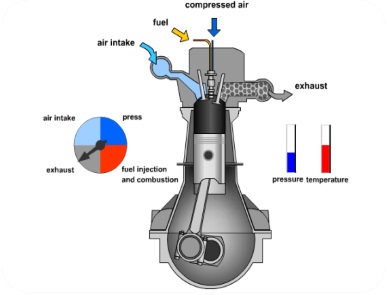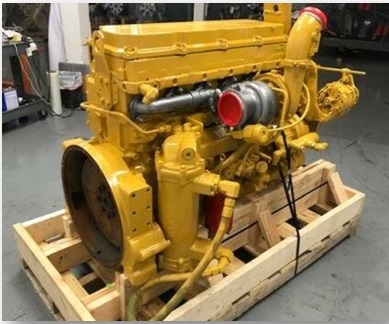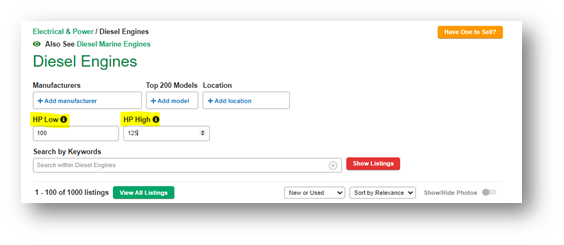French engineer, Rudolf Diesel, first set up shop on the streets of Paris in 1885 with the intention of manufacturing the world’s first compression ignition engine. Rudolf, some 13 years later, accomplished his mission, and industries were introduced to a new and unique power source known as the Diesel Engine. Over a century later and with many modifications and improvements made, we continue to rely heavily upon the diesel engine in the 21st century. The diesel industry as of 2021 is worth a massive $212.4 Billion USD and represents 25% of all types of oil produced and sold.
In the following article we shall cover some of the basics regarding how a diesel engine functions, its purpose, some of Surplus Record’s recommended tips and tricks to assist with the purchasing process of used/new diesel engines for sale, and notes that a buyer should be aware of when on the lookout for used diesel engines for sale.
What is a Diesel Engine?
A Diesel Engine is a type of engine that utilizes compression ignition to turn the energy found in diesel fuel (oil) into rotary mechanical energy. When compared to the equally recognizable Petrol Engine, the way that it functions is similar, being that internal combustion is what produces the mechanical energy. However, the way that a diesel engine functions is much simpler in fact.


On the Surplus Record catalog one can view:
- Used Diesel Engines for sale
- New Diesel Engines for sale
- Remanufactured Diesel Engines for sale
- Engine Assembly for Sale
- Industrial Diesel Engines for sale
- Diesel Engine cores for sale (the diesel engine core is the heart of the engine which usually contains the compressor, burner, and turbine. Diesel core engines for sale are better suited for the sourcing of parts, remanufacturing engines completely, or purchased as old-complete engines.)
- Marine Diesel Engines for Sale
How does the Diesel Engine function?
Firstly, air enters a cylinder chamber through an intake valve (see image one above) which then moves the piston downwards. The piston then returns to its original position (upwards) once more and compresses the air to such a degree that temperatures rise. At a calculated moment, diesel is injected into this hot bubble of compressed air which ignites and forces this same piston downwards once more. When this process is repeated, the piston turns the crankshaft component of the engine, thus, generating mechanical power and energy.
Why Diesel Engines Last Longer
Diesel engines have a justly earned reputation of lasting longer than petrol (aka gasoline) engines. Why? Part of the reason owes to the inherent differences in construction between the two types of engines, most of which occur in the combustion section of the engine. For instance, when igniting fuel, gasoline engines rely on their fuel’s tendency to evaporate quickly, and they function by compressing gasoline and air, which is then ignited via a spark plug. But diesel doesn’t evaporate as easily. This means that diesel engines simply compress air as part of their combustion process, shooting atomized fuel into high-temperature air. The pressures involved in this process mean that diesel engines need larger crankshafts and camshafts, which tend to last longer due to their sturdiness. The atomization process constantly lubricates the engine’s moving parts, reducing wear. And diesel engines employ more stable gears rather than the timing belts used in gasoline engines.
The nature of diesel itself also aids engine longevity. As mentioned previously, the atomization of diesel during combustion helps reduce component wear. Diesel also ignites at a lower temperature (410°F versus gasoline’s 495°F), which puts less heat stress on the engine. Diesel also lacks the somewhat acidic nature of gasoline and won’t wear away components such as piston cylinder rings.
Finally, diesel engines are typically more efficient and operate at lower revolutions per minute (RPMs) than gasoline engines. This leads to less overall wear in general.
Special Considerations for Marine Diesel Engines
Diesel vs Petrol
When selecting a marine engine, buyers should remember several key factors. After all, marine engines operate in a unique environment, and the stresses and strains that land-based engines must overcome are significantly different. The first consideration that potential purchasers must address is whether to select a petrol engine over a diesel engine. Petrol engines enjoy several advantages, such as a generally lower purchase price, quieter operating volume, and decreased exhaust odor. However, petrol engines provide less torque than diesel options, making them inappropriate for powering larger craft. If you need to power a big boat, then you’ll want to use diesel.
You’ll also need to consider how much power is required to move your vessel. If you choose a diesel motor, that calculation will determine whether you select one of two types: four-stroke or two-stroke. A four-stroke motor operates at up to 850 rpm and is appropriate for smaller ships. Two-stroke engines operate at a slower 100 rpm, but they generate more power and cost less to operate, making them ideal for large deep-sea vessels.
Reliability
The reliability of the diesel motor should also factor into the decision-making process. When engines fail in industrial or ground-transportation contexts, lost productivity and opportunity cost comprise much of the expense. But the loss of power while a ship is at sea can also put lives in danger.
Maintenance
Similarly, ease of maintenance must be calculated as well. Because of federally mandated emissions requirements, most marine diesel engines contain technology that makes them more difficult to service. Purchasers may prefer a selection that doesn’t require specialized tools or additional training to keep running.
Finally, a diesel engine should strike a balance between engine weight and power. Newer models with greater volumetric efficiency are typically more desirable.
Uses and Applications
As mentioned, diesel engines are highly utilized in today’s modern market, and they prove to be extremely practical for use throughout a variety of different industries. These industries include: Nuclear, Food, Agriculture, Hospitality, Chemical, Medical, Paper, Pulp and Plastic Processing, just to name a few. Throughout these varying industries, the diesel engine has differing applications, the most common being powering of automobiles such as tractors, trucks, heavy construction machinery and cars.
Important Considerations Before Buying Diesel Engines
Inspect the Oil
One of the most important steps to consider when viewing a used diesel engine for sale is the condition of the engine’s oil. Start by removing the dipstick (or ask the owner to send you a video/picture) to view the color and appearance of the oil. If there is white coloring in the oil or milky characteristics about the oil’s appearance, it can mean that there are internal problems with the engine, and it may need replacement.
No Servicing = Wear and tear
A diesel engine should be serviced every 6 months at minimum or if functioning within an automobile every three thousand miles. When the correct servicing is not conducted regularly and the engine is left unoperated for long periods/continued to be operated regularly, this can significantly increase the probability of wear and tear and engine inefficiencies. A seller should always be able to provide the buyer with a service history of the engine, completed by professionally trained mechanics.
Size of the Engine (Horsepower)
Whether inspecting a used diesel engine for sale or a new diesel engine for sale it is important to consider the size of the engine you need. Diesel engines can be categorized into small, medium and large in terms of power, which have power outputs ranging from an average low of 50 horsepower to an average high of 1800 horsepower or more. By understanding your personal requirements, it can be easier to select the ideal engine and avoid choosing one that is over or undersized. On Surplus Record, we have available engines ranging in horsepower output from 10 – 2500 HP+.
Age
Age doesn’t necessarily mean unreliability, especially if produced by a reputable manufacturer and serviced regularly. A reputable manufacturer is also likely to have produced a wider range of spare components and parts which makes sourcing these parts easier when the time comes. If the engine is over 10 years in age, it is advisable to inspect the manufacturer’s name and request to view a service history to ensure a successful purchase.
Accessories
With a variety of accessories available in today’s market for engines, it can be ideal to purchase a used or new engine with such extras. Cooling fans can be a desirable accessory for diesel engines for those who desire improved fuel economy and reduction in noise, as well as more efficient performance. Purchasing these fans or an engine which has a fan included is highly recommended by the Surplus team.
Surplus Record: Tips and Tricks
To assist you further when searching for used diesel engines for sale on our platform, we have attached five tips and tricks to use when navigating.

- Use our Horsepower filters at the top of the category page for Diesel Engines to enter in a range for HP to instantly filter down the listings based on your requirements.
- Make use of our Location Settings: At the top of the page, when on the list for your desired piece of equipment/machinery, enter your desired location and you’ll be taken directly to what we have available in your area.
- Looking for an Auction? On the listing page, select the blue checkbox on your right which says “Auction” and you’ll be taken to our available products for sale via auction.
- On a Budget? Select the toggle “Sort by Relevance” and then click “Price low to high” to view our cheapest to more expensive products for sale.
- Don’t forget the Search Bar: Already know what you are looking for? Utilize our search tab at the top of your page to find specific listings out of hundreds available.
Quick Access: Diesel Engine Dealers
- Diesel Sales | Illinois
- Swift Equipment Solutions | Texas
- Industrial Diesel Inc | Texas
Quick Access: Dealers that Specialize in Diesel Engines
Quick Access: Diesel Engine Manufacturers
Our top manufactures available at Surplus Record for used diesel engines include:
- Caterpillar Diesel Engines
- Cummins Diesel Engines
- Perkins Diesel Engines
- Detroit Diesel Engines
- John Deere Diesel Engines
Need More Help? Or further information about Diesel Engines? Head on over to the “Wanteds” section of our website and select “Buy” at the top and “Generators & Engines” for the industry. Fill out the form and a dealer that specializes in Engines will get back to you ASAP. It’s free to do, and our dealers are happy to help!

